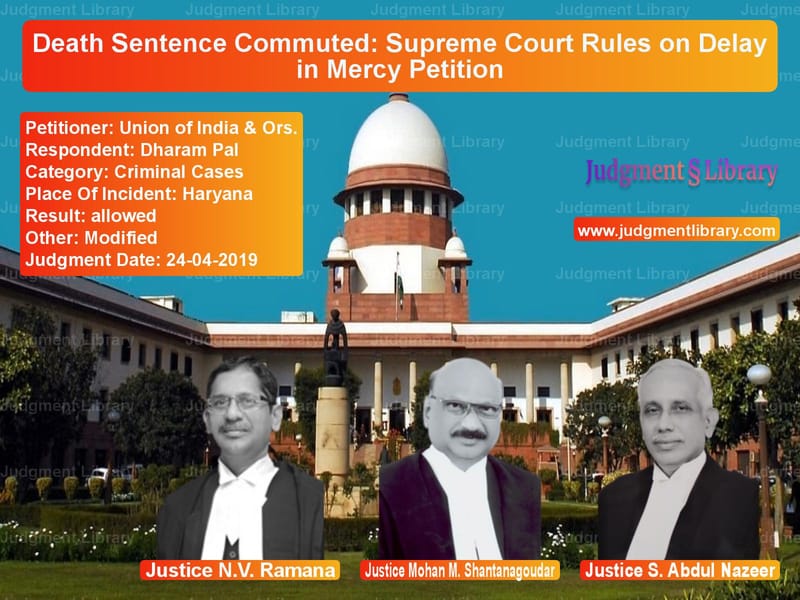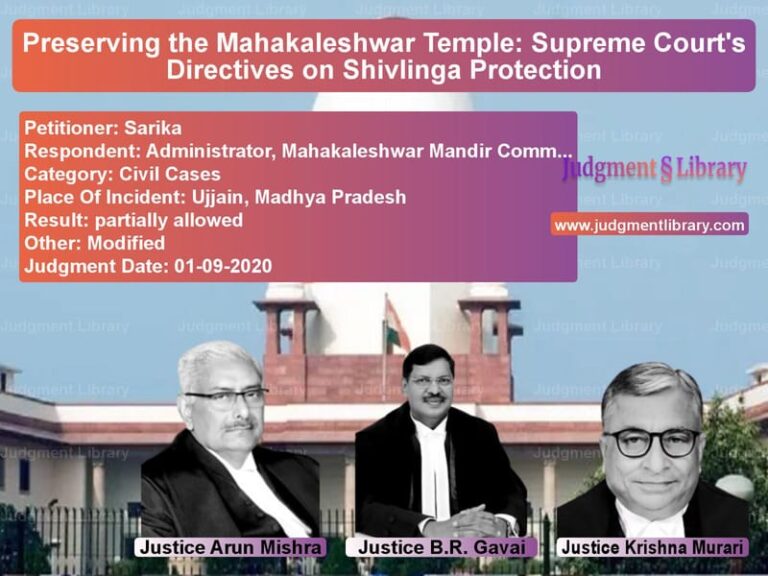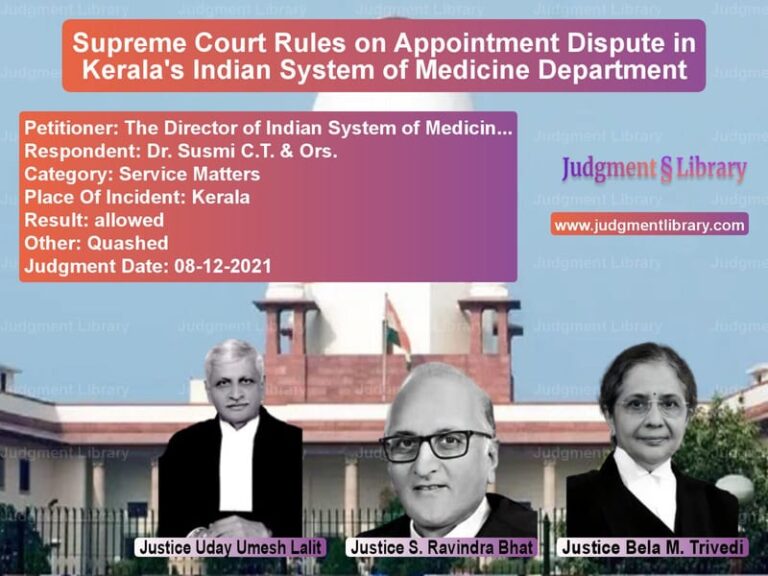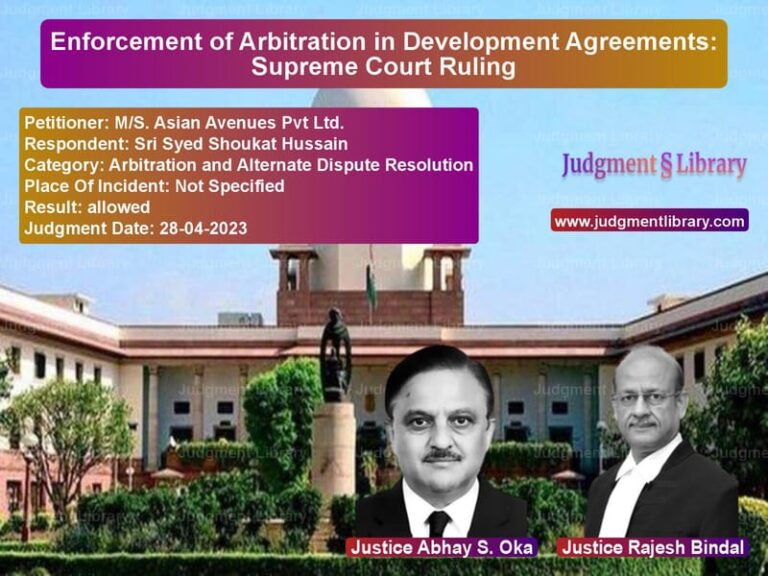Death Sentence Commuted: Supreme Court Rules on Delay in Mercy Petition
In a landmark ruling, the Supreme Court of India commuted the death sentence of Dharam Pal to life imprisonment, citing an inordinate and unexplained delay in the rejection of his mercy petition. The case, Union of India & Ors. vs. Dharam Pal, revolved around the legality of prolonged solitary confinement and the fundamental rights of a death row prisoner.
The ruling sets a significant precedent on the constitutional validity of solitary confinement before the disposal of a mercy petition and the effect of prolonged delays on the execution of capital punishment.
Background of the Case
Dharam Pal was convicted of the murder of five persons belonging to the same family while he was out on bail for a prior conviction of rape. The legal proceedings in the case unfolded as follows:
- 1991: Dharam Pal was convicted under Sections 376 and 452 IPC and sentenced to ten years’ rigorous imprisonment for rape.
- 1993: While out on bail, he and his brother committed the murder of five family members of the rape victim.
- 1997: The Sessions Court sentenced both to death.
- 1998: The Punjab and Haryana High Court affirmed the conviction and sentence.
- 1999: The Supreme Court commuted the death sentence of his brother but upheld Dharam Pal’s capital punishment.
- 1999-2013: Dharam Pal remained on death row, awaiting a decision on his mercy petition.
- 2013: The President of India rejected his mercy plea after 13 years and 5 months.
- 2013: Dharam Pal filed a writ petition before the Punjab and Haryana High Court seeking commutation of his death sentence.
- 2019: The High Court ruled in his favor, converting his sentence to life imprisonment.
- 2019: The Union of India challenged this decision in the Supreme Court.
Arguments by the Appellant (Union of India)
The Union of India argued:
- The delay in the mercy petition’s disposal was justified due to procedural complexities.
- The nature of the crime—a cold-blooded murder of five people—warranted the death penalty.
- The High Court’s ruling did not sufficiently consider the gravity of the offense.
- The solitary confinement was as per the prison rules and did not violate fundamental rights.
Arguments by the Respondent (Dharam Pal)
The respondent countered with the following arguments:
- The delay of 13 years in deciding his mercy petition amounted to mental cruelty and violated Article 21 of the Constitution.
- He had already undergone 18 years in solitary confinement, which was illegal and unjust.
- During this period, he was subjected to inhumane treatment, which made the execution of the death penalty unconstitutional.
- His acquittal in the rape case was not placed before the President during the mercy petition proceedings, causing grave prejudice.
Supreme Court’s Observations and Ruling
The Supreme Court considered whether the delay in executing the death sentence and the prolonged solitary confinement warranted commutation to life imprisonment.
“Solitary confinement prior to the rejection of the mercy petition is per se illegal and amounts to separate and additional punishment not authorized by law.”
The Court relied on earlier decisions, including Shatrughan Chauhan vs. Union of India and Sunil Batra vs. Delhi Administration, which had held that an inordinate delay in deciding mercy petitions amounts to mental cruelty and justifies commutation.
The Court also emphasized that once an appeal is pending before constitutional authorities, a convict cannot be placed in solitary confinement:
“A prisoner under sentence of death can be confined separately, but solitary confinement before the rejection of the mercy petition violates Article 21 of the Constitution.”
Final Ruling
The Supreme Court ruled:
- The High Court was justified in commuting Dharam Pal’s death sentence to life imprisonment.
- The delay of over 13 years in deciding the mercy petition was unjustified and unconstitutional.
- Solitary confinement of 18 years amounted to an additional punishment not sanctioned by law.
- The respondent would be released after completing 35 years of actual imprisonment, including time already served.
Implications of the Judgment
This judgment has significant implications for death penalty jurisprudence in India:
- Protection against solitary confinement: The ruling reinforces that solitary confinement before the rejection of a mercy petition is illegal.
- Inordinate delays in mercy petitions: The decision clarifies that prolonged delays in deciding mercy pleas can lead to commutation of the death penalty.
- Fairness in capital punishment cases: The Court recognized that procedural irregularities, such as failing to present acquittals before constitutional authorities, can render death sentences unfair.
- Need for expedited mercy petition decisions: The ruling urges authorities to ensure timely disposal of mercy petitions to avoid constitutional violations.
The Supreme Court’s ruling in Union of India & Ors. vs. Dharam Pal sets a crucial precedent on how delays and procedural irregularities impact death penalty cases, reinforcing the importance of constitutional safeguards for convicts.
Petitioner Name: Union of India & Ors..Respondent Name: Dharam Pal.Judgment By: Justice N.V. Ramana, Justice Mohan M. Shantanagoudar, Justice S. Abdul Nazeer.Place Of Incident: Haryana.Judgment Date: 24-04-2019.
Don’t miss out on the full details! Download the complete judgment in PDF format below and gain valuable insights instantly!
Download Judgment: Union of India & Ors vs Dharam Pal Supreme Court of India Judgment Dated 24-04-2019.pdf
Direct Downlaod Judgment: Direct downlaod this Judgment
See all petitions in Murder Cases
See all petitions in Custodial Deaths and Police Misconduct
See all petitions in Judgment by N.V. Ramana
See all petitions in Judgment by Mohan M. Shantanagoudar
See all petitions in Judgment by S. Abdul Nazeer
See all petitions in allowed
See all petitions in Modified
See all petitions in supreme court of India judgments April 2019
See all petitions in 2019 judgments
See all posts in Criminal Cases Category
See all allowed petitions in Criminal Cases Category
See all Dismissed petitions in Criminal Cases Category
See all partially allowed petitions in Criminal Cases Category







